Ata-ul-Haye Nasir, Al Hakam
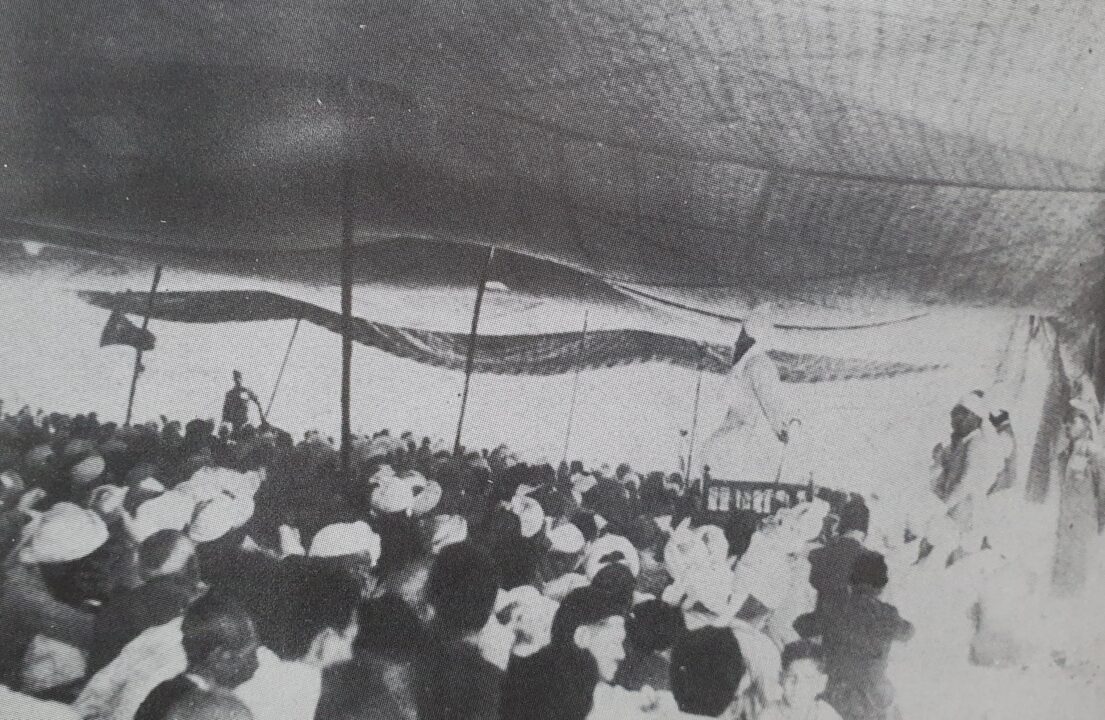
British Prime Minister’s appeal
In his New Year’s Message for the year 1920, along with the other Premiers of the Empire, the then British Prime Minister, David Lloyd George, appealed to the people of the British Commonwealth to pay heed to the teachings of Christianity and suggested that this was the only means for the foundation of world peace.
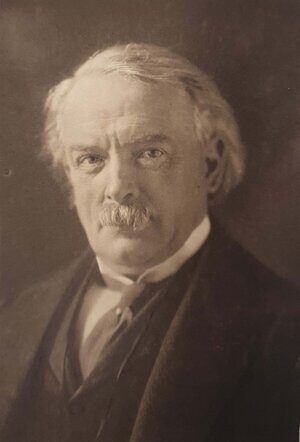
The People of London wrote:
“New Year’s Message From Premiers.
“‘Brotherhood of Humanity.’
“The following New Year’s message, which has been signed by Mr Lloyd George, Sir Rbt. Borden, Mr WM Hughes, Gen. Louis Botha (who has since died), Mr WJ Massey, and Mr RA Squires, as Prime Ministers of the British Empire, was published yesterday throughout the world. It has been entrusted to the National Laymen’s Missionary Movement of Great Britain and Ireland:
“‘Material Force Useless.
“‘To our fellow citizens of the British Empire—The war, in shaking the very foundations of ordered civilization, has driven all thoughtful men to examine the bases of national and international life. It has become clear today, both through the arbitrament of war and through the tests of rebuilding a life of peace, that neither education, science, diplomacy, nor commercial prosperity, when allied with a belief in material force as the ultimate power, are real foundations for the ordered development of the world’s life. These things are in themselves simply the tools of the spirit that handles them. Even the hope that lies before the world of a life of peace protected and developed by a League of Nations is itself dependent on something deeper and more fundamental still. The cooperation that the League of Nations explicitly exists to foster will become operative in so far as the consenting peoples have the spirit of goodwill. And the spirit of goodwill among men rests on spiritual forces; the hope of a “brotherhood of humanity” reposes on the deeper spiritual fact of the “Fatherhood of God”.
“‘The Ultimate Foundation
“‘In recognition of the fact of that Fatherhood and of the Divine purpose for the world, which are central to the message of Christianity, we shall discover the ultimate foundation for the reconstruction of an ordered and harmonious life for all men. That recognition cannot be imposed by Government. It can only come as an act of free consent on the part of individual men everywhere. Responsible as we are in our separate spheres for a share in the guidance of the British Empire as in places it faces the problems of the future, we believe that in the acceptance of those spiritual principles lies the sure basis of world peace. We would therefore commend to our fellow-citizens the necessity that men of goodwill who are everywhere reviewing their personal responsibilities in relation to the reconstruction of civilisation should consider also the eternal validity and truth of those spiritual forces which are in fact the one hope for a permanent foundation for world peace.’” (The People, 4 January 1920, p. 16)

The Marlborough Express of New Zealand and The Evening Telegraph of Dundee also published this message in their 5 January 1920 issues.
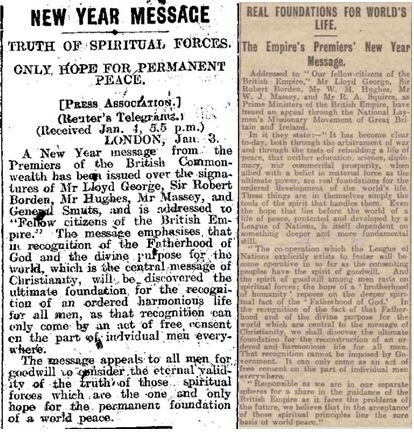
The Aberdeen Daily Journal of 5 January 1920 wrote that Bishop Deane of St. James’s Episcopal Church in Aberdeen stated that “never in all history had there been an appeal put forward by the hands of Governments so entirely religious as that one was – and every word of it was true.”
Bishop Deane further said that “In the newspaper, the appeal had been headed ‘Back to God,’ but he would have liked to have seen it ‘Back to Christ.’” (Ibid.)
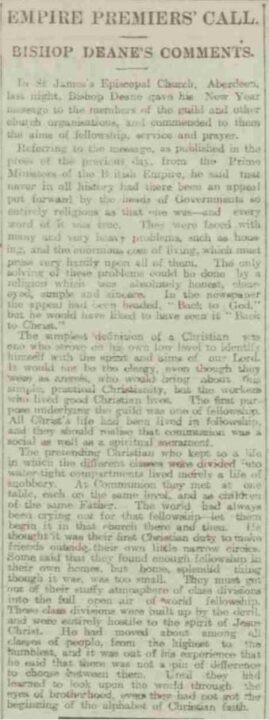
The Civil and Military Gazette reported about this message in its 4 January 1920 issue, and on 7 January, republished it with some corrections as conveyed by Reuters.
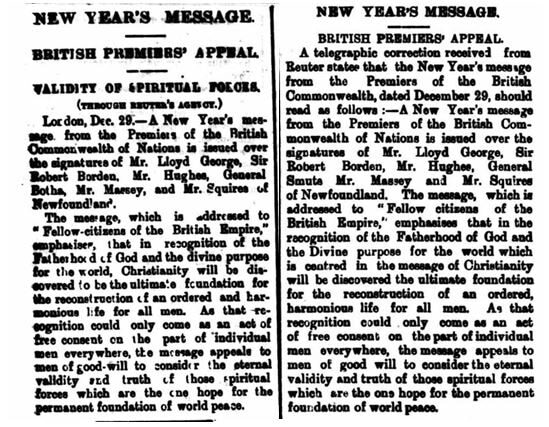
The Australian Christian Commonwealth, the organ of the Methodist Church in South Australia, stated:
“It was an excellent bit of reading that came to us from England by Tuesday morning’s papers, which we reprint, and we thank God for it and take courage:
“‘The Archbishop of Canterbury (Dr Davidson), the Archbishop of York (Dr. [Cosmo Gordon] Lang), and the Free Church leaders (Revs. F.B. Meyer, Dr John Scott Lidgett, John Howard Shakespeare, and Dr A. Guttery) as leaders of churches, have issued a new year’s message, based on the appeal of Mr Lloyd George and the Prime Ministers of the self-governing dominions, that the efforts for bettering the world should not be based merely on material things. The message says the Prime Minister’s appeal is the utterance of a statesman who has had experience in the arbitrament of war and adds: ‘We should seek the kingdom of God and his righteousness. We should test all our actions, social, industrial, and international, by the standard of His teaching. We put before professing Christians this three-fold call, firstly to rededicate ourselves to Christ’s active service; secondly, in combating the impulse for mere selfish gain to test our actions by Christlike standards; thirdly, to unite in prayer, in counsel, and in action, so that our common Christian citizenship may become the foremost power in the national life.’’” (The Australian Christian Commonwealth, 16 January 1920, p. 9)

Hazrat Musleh-e-Maud’sra response
In response to the messages from the British Prime Minister and the Christian clergy, Hazrat Musleh-e-Maudra delivered two lectures, the first in Lahore and the second in Amritsar.
Lecture in Lahore
On 15 February 1920, Hazrat Musleh-e-Maud, Mirza Bashir-ud-Din Mahmud Ahmadra delivered a lecture at the Bradlaugh Hall in Lahore, titled “Kiaa dunya ke amn-o-amaan ki buniyad Isa’iyyat par rakhi ja sakti hay?” – Could the foundation of world peace be laid on Christianity?
The session was presided over by Khan Zulfiqar Ali Khan, and the attendees included various non-Ahmadi Muslims, Hindus, and Sikhs as well.
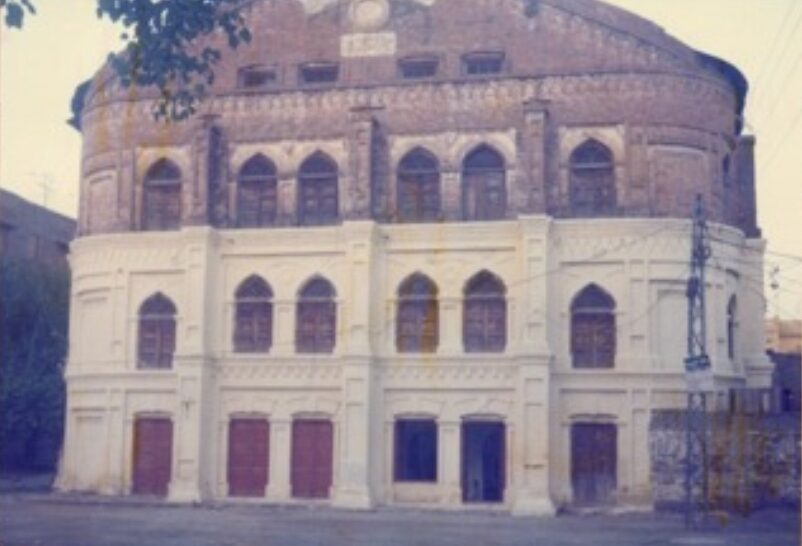
At the beginning of his lecture, Huzoorra mentioned the advent of the Holy Prophet Muhammadsa and said that the spirit and passion which he had instilled in his Companionsra could be known through an incident when he asked them to conduct a census of the Muslims, and the number came to be 700. Upon this, a Companionra said to the Holy Prophetsa that since they were so many in number, they had no reason to fear being effaced from the face of the earth.
Huzoorra said that it was indeed their faith that spoke, not their number. This passion was a reflection of the power of faith, sincerity, and certainty that was present in their hearts, and through these very traits, they gained great success in the world wherever they went. Nothing could hinder them since they possessed such great strength of faith and certainty.
Huzoorra continued by saying that today the number of Muslims who profess to follow the Holy Prophetsa is said to be 400 million, and is spread in all corners of the world. However, unfortunately, in contrast to the unshakable firmness of those 700 Companionsra, these 400 million Muslims are living in a sea of constant apprehension. There is no doubt that everything around them seems to have joined together to destroy them. By now, only religious people were opposing them, however, recently, a voice has been raised by a person who is not religious, but a stalwart of the political world. He has claimed that Christianity will be discovered as the ultimate foundation for the reconstruction of an ordered and harmonious life for all people. In addition to this, he appealed to the people to accept Christianity.
Huzoorra continued by saying that since these words have been uttered by a non-religious person who does not know what the arguments are for the truthfulness of a religion, they do not hold any significance. However, if one looks at it as a call from the one who is responsible for peace, for being the Prime Minister of Britain, then its importance increases manifold and produces certain dangers as well.
Huzoorra said that during his visit to Lahore, he deemed it essential to respond to this call on behalf of Islam. This announcement was not addressed to Muslims in particular; in fact, it was addressed to all citizens of the British Empire. However, it is the Muslims who are most vitally affected by the message, because these are the people who are closest to Europe and in immediate contact with Christianity. Hence, due to the fact that through this call, Muslims have been indirectly called out, I am here to respond on behalf of Islam.
Huzoorra said that there are many who have become anxious after this announcement, considering it a disrespect to their religion, and asking as to what right a political leader holds to call people to his religion. However, they are wrong about this. In fact, I am pleased, since we have witnessed in the recent past that Europe is inclining towards materialism, and many high-profile personalities do not pay attention to religion. Now, when a political stalwart gives us a religious message, he will have to listen to our response as well. God has blessed us with this opportunity. Hence, when Islam has been addressed indirectly, a response from Islam will also have to be listened to, and we will respond to it from the depths of our hearts. He will have to listen to our response with calmness, just as we have received his message with calmness, and if he does not do so, then his countrymen will laugh at him. Thus, this is an opportunity for us to present the teachings of Islam, from which we must benefit. There is no reason to show anger or feel disrespected.
After this, Huzoorra narrated the translation of the Prime Minister’s message which stated that the peace of the world has been tarnished and there is a need to establish it once again, that will be based on the teachings of Christianity. He suggested that peace can never be established without this.
Huzoorra said that he wished to speak on this matter from two aspects. Firstly, whether Christianity can establish peace, and secondly, if it is unable to do so, then which religion would do it? Before proceeding further, Huzoorra said, I deem it essential to make it clear that the flaws in the followers of a certain religion cannot be used as an argument for proving the flaws of that religion itself. One ought to see what its teachings are. It can only be declared flawed if implementing its teachings causes a decline in one’s life; however, if one sees a decline due to abandoning its teachings, then the religion can never be blamed.
Huzoorra continued by saying that Mr Lloyd George has stated in his message that peace can be established if the world believes in God as the father. People may wonder how peace can be established through this principle, but the point is that when different people have a relationship with one common thing, a harmonious connection is fostered among those people as well. Thus, when all of the people believe in God as the spiritual ‘father’, it will be as if they deem each other as ‘brothers’, and in this scenario, there will be no dispute among those people. However, a point that arises here is that this principle can only be accepted if two points are solved. Firstly, is it only Christianity that presents the belief that God is the spiritual ‘father’, or do other religions also present it? Secondly, if any other religion does not profess this very belief but presents another belief that is better than that, why should one leave it and accept Christianity?
After this, Huzoorra shed light on the fact that this belief is found in nearly all religions of the world, in some form or another, even in primitive nations. Moreover, Christianity itself has derived it from another nation. Huzoorra then presented a comparison between the teachings of Islam and Christianity in light of the teachings presented in the Holy Quran and the Gospels. Huzoorra proved the superiority of the Islamic teachings and stated that world peace could be established through the Islamic teachings alone, and that it could not happen through the teachings of Christianity.
Hazrat Musleh-e-Maud’sra speech lasted for two and a half hours, and the event concluded with a silent prayer led by Huzoorra. (Al Fazl, 26 February 1920, pp. 3-4)
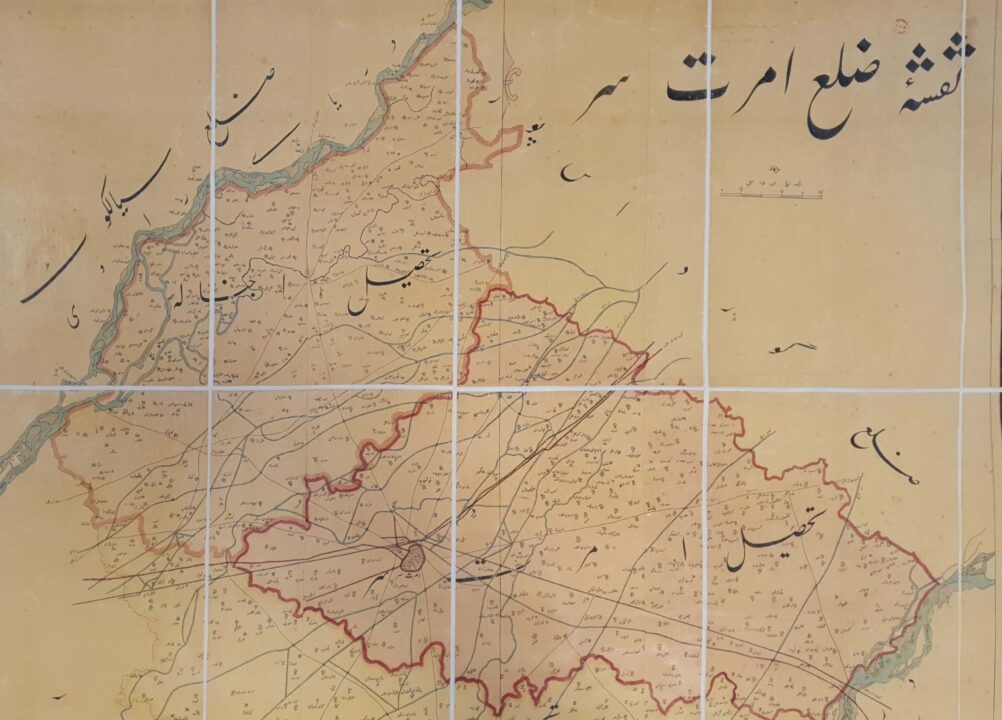
Lecture in Amritsar
On 14 April 1920, Hazrat Musleh-e-Maudra delivered another lecture on this issue, at the Vande Mataram Hall in Amritsar, titled “Kiaa dunya ke amn-o-amaan ki buniyad Isa’iyyat par rakhi ja sakti hay ya Islam par?” – Could the foundation of world peace be laid on Christianity or Islam?” The session was presided over by Hazrat Sir Chaudhry Muhammad Zafrulla Khanra and the attendees included a huge number of Hindus and Muslims.
The Civil and Military Gazette reported:
“Mirza Bashir-ud-Din Mahmud Ahmad, of Qadian, delivered a lecture on April 14 in the Bande Mataram Hall on the subject: ‘Can the foundation of a world peace be based on Christianity or Islam.’ He tried in his lecture to show that Islam was the only religion on which world peace could be founded. Maulvi Ata Ullah, a Moslem preacher, made a counter-demonstration in the form of a religious sermon outside […]. This is due to a long-standing antagonism between the old-school Moslems and the followers of the Mirza.” (The Civil and Military Gazette, 18 April 1920, p. 5)
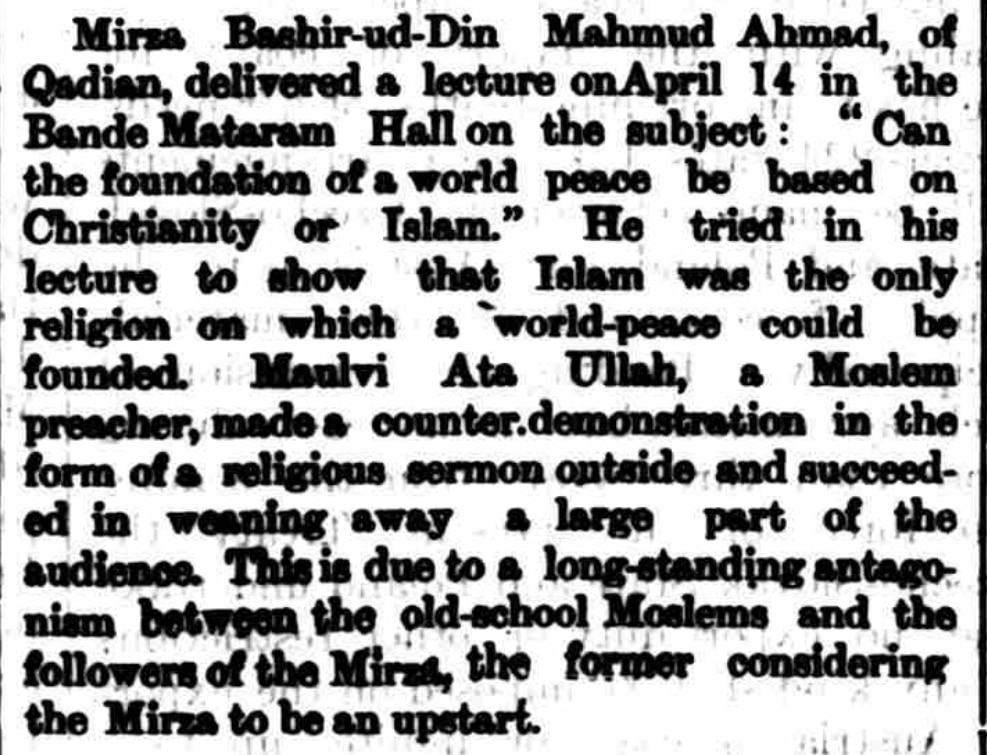
In the beginning, Huzoorra mentioned the New Year’s Message by the British Prime Minister, Mr David Lloyd George.
After this, Huzoorra said:
“I do not wish to comment on the intention and aim behind this announcement from Mr Lloyd George, nor do I say whether or not it was made as a result of thorough contemplation and pondering. Moreover, I do not wish to say whether or not he kept in mind the fundamentals of Christianity while making this announcement. However, I say that the objective for which it has been announced, cannot be fulfilled in this way. Moreover, despite having certain characteristics, Christianity is neither able to lay the foundation of world peace, nor does it hold the strength to establish peace in the world. Today, I am here to narrate to you my views about this announcement, and to prove that Islam is the only religion upon which the foundation of world peace can be laid. If the world attempted to establish a ‘castle’ of peace on any different lines, it would be as if it were made on a sandbar, which could collapse at any time. Hence, if the world desires lasting peace, they are required to lay the foundation of the ‘castle’ of peace on Islam.” (Al Fazl, 19 April 1920, p. 2)
Further, Huzoorra said that Mr Lloyd George did not particularly address the Muslims, however, they are included amongst those who have been addressed by him:
“For this reason, I deem it essential to respond to it on behalf of Islam, and I wish to state the Islamic point of view in this regard.” (Ibid.)
After this, Huzoorra expressed that he was pleased to see the politicians inclining towards religion:
“I wish to speak about this announcement from two aspects. Firstly, to speak about those attributes of Christianity that, according to Mr Lloyd George, are a means to establish peace. Secondly, the methods that help foster peace have been taught by Islam. The first point Mr Lloyd George has mentioned is that believing in God as the father is a belief that can establish peace, and second, that peace can be established if the world accepts those principles of virtue that have been taught by Christianity. I will address both points separately. If the point that peace can be established by believing in God as the father is correct, one needs to ponder as to whether this belief is found in Christianity alone or in other religions as well. One finds that it is found in other religions as well [i.e. the belief in God as the spiritual father.]” (Ibid.)
As proof of this, Huzoorra mentioned that this belief is found in various nations, from the least civilised to the most civilised ones. If such is the case, then what is the need for the followers of those religions to accept Christianity? (Ibid.)
When Huzoorra mentioned a hadith of the Holy Prophetsa in which he said that God Almighty is far more merciful to His servants than a mother, the then imam of the local Khairuddin Mosque, Syed Ataullah Shah Bukhari – later to be known as the founding member of the Majlis-e-Ahrar – stood up and made hue, and demanded from Huzoorra to state the exact reference of this hadith including the name of the book, page number, line number, and place of publication etc. He used vile language as well and attempted to instigate the members of the Jamaat there; however, Huzoorra instructed the Ahmadis to stay calm, which they obeyed. When Ataullah Sahib continued this chaos, the police sent him outside along with his fellows. (Ibid.)
Once the situation was settled, Huzoorra continued the lecture and narrated in detail the fact that Islam has given a teaching that is able to foster lasting peace and harmony in the world. Huzoorra presented a comparison between the teachings of Islam and Christianity, in light of the Holy Quran and the Gospels, proved the superiority of Islam over all other religions, and made it clear that world peace can only be established through the teachings of Islam. (Ibid.)
As far as the act of Attaullah Sahib is concerned, he only wanted to interrupt the lecture by initiating a discussion on the authenticity of the hadith. Thus, for this reason alone, he created such a scene there.
In its 19 April 1920 issue, while narrating the incident that occurred during the lecture, Al Fazl published the full Arabic text of the above-mentioned hadith along with its translation and full reference. The hadith states:
عَنْ عُمَرَ بْنِ الْخَطَّابِ رضی اللّٰہُ عنہ قَدِمَ عَلَى النَّبِيِّ صَلَّى اللّٰہُ عَلَيْهِ وَسَلَّمَ سَبْيٌ، فَإِذَا امْرَأَةٌ مِنَ السَّبْيِ قَدْ تَحْلُبُ ثَدْيَهَا تَسْقِى، إِذَا وَجَدَتْ صَبِيًّا فِى السَّبْىِ أَخَذَتْهُ فَأَلْصَقَتْهُ بِبَطْنِهَا وَأَرْضَعَتْهُ، فَقَالَ لَنَا النَّبِيُّ صلّى اللّٰہُ عليه وسلّم: أَتَرَوْنَ هَذِهِ طَارِحَةً وَلَدَهَا فِى النَّارِ۔ قُلْنَا: لَاوَهْىَ تَقْدِرُ عَلَى أَنْ لَا تَطْرَحَهُ۔ فَقَالَ: اللہُ أَرْحَمُ بِعِبَادِهِ مِنْ هَذِهِ بِوَلَدِهَا
Hazrat Umarra bin al-Khattab narrated, “Some Sabis were brought before the Prophetsa and behold, a woman amongst them was milking her breasts to feed, and whenever she found a child amongst the captives, she took it over her chest and nursed it. The Prophetsa said to us, ‘Do you think that this lady can throw her son in fire?’ We replied, ‘No, if she has the power not to throw it [she would not].’ The Prophetsa then said, ‘Allah is more Merciful to His servants than this lady to her son.’” (Sahih al-Bukhari, Kitab al-adab, Hadith 5999; Sahih Muslim, Kitab at-tawbah, Hadith 2754; and Mishkat al-Masabih, Kitab ad-da‘waat, Hadith 2370)

